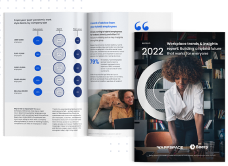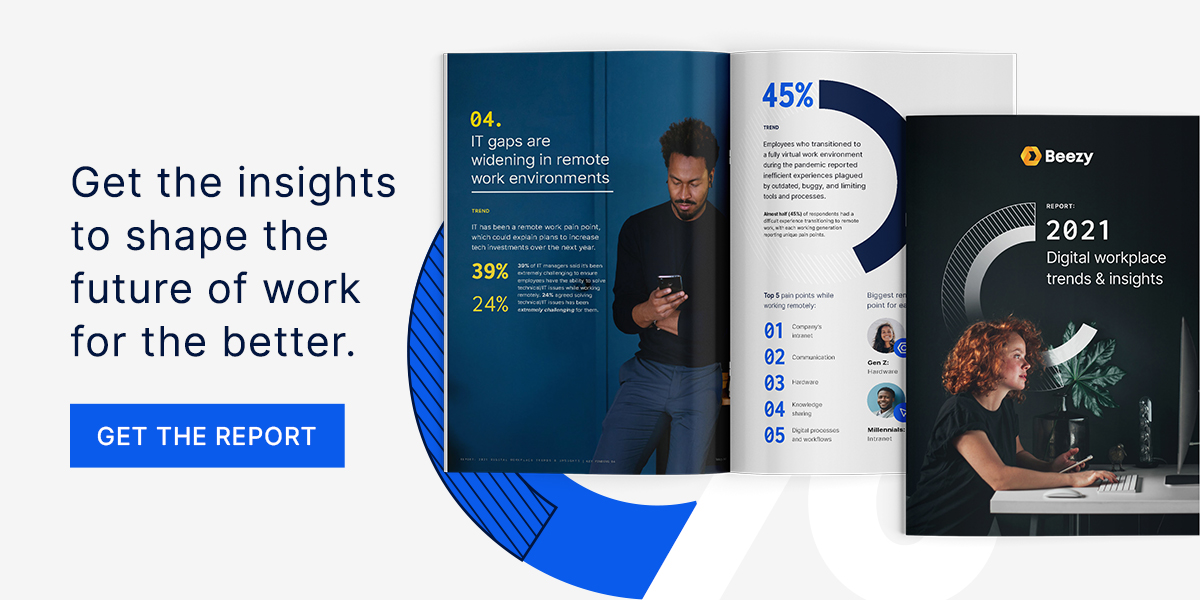
How our Customer Success team takes the fear out of collaboration
Sasja Beerendonk
May 27, 2021You've heard the saying 'change is hard.’ It is. Especially when you’re talking about habits and ways of working. This is why change management is at the core of my job as a Customer Success Manager (CSM). I’m here to help the organizations we work with meet their business goals and employee experience objectives.
When you consider that current workplace tools and technologies are failing to meet employees’ needs in many organizations, change is necessary. According to our recent research report:
61% of employees say they're not completely satisfied with their company's workplace tools and technologies.
Part of my job is to address this pain point and make sure satisfaction is high with Beezy, because it’s a solution that brings together the tools you’re already using.
One of our main goals in the Customer Success team is to help create a work environment that fosters more open, social collaboration and makes it easier for everyone to participate.
You might be surprised to hear, then, that some of our customers actually get anxious about Beezy’s social capabilities. Why? Probably because working collaboratively in this way can be a bit scary for some people, especially when it means changing the way you collaborate.
But these changes will mean the difference between your employees feeling disengaged (which we’ve found that 51% do right now) and being happy with the tools and technologies they’re using.
Collaboration that's more social can boost employee engagement
Social media features are popular because they’re engaging. Workplace tools that recreate these experiences, like digital communities, newsfeeds, employee profiles, blogging, and bots, can enhance communication and collaboration without the need for another video call.
In a digital workplace, I think these social capabilities are important because they can help remove silos and give people the ability to contribute to work happening across the organization.
Remember what your employee engagement objectives are and stick to them
When our customers start with Beezy, they’ve typically got business goals like 'improve employee engagement' or 'give everyone a voice.' And then sometimes you start working with them, and suddenly the customer seems to forget about their objectives. Old habits kick in.
A customer ‘fear’ we encounter in the Customer Success team comes from CEO or managers being concerned about anyone just posting anything in the digital workplace.
What we see happening with some of the organizations we work with is this:
- Disabling likes and comments ("We don't want anyone to start giving opinions")
- Limiting who can create communities ("Certainly not everyone! It will become a chaos")
- Limiting members' use of tools within a community ("We don't want them to use a Forum" or asking for moderation of posts)
These things don’t seem very collaborative, do they?
Beezy is all about creating communities where employees are encouraged to collaborate and work together. The basic principle is: If you’re a member of a community, you’re able to share and edit content. Sure, we can disallow some tools for members, only allowing owners. But should we? Communities are all about collaboration.
In this new era of hybrid working, where some employees work remotely and others work in the physical office, it’s more important than ever to find efficient ways to collaborate.
How would you feel about someone changing your file? Our tip: Let it go
One common objection we’re faced with is about document collaboration and editing files. With files particularly, people seem to have entitlement issues: It's my file. There’s a fear of putting files out there because someone might edit it, without 'permission'. Or what if they delete it?!
With our Beezy users, we find that most people still prefer to keep their copy of a file. At least while they’re working on it. This has been a long-time habit, dating back from when 'anywhere, anytime' access wasn't a thing yet.
This notion of being precious, or protective, of information is something we push back on. We try to say: Think about your business objectives. If someone’s out there to delete your content, the issue isn’t about your file. It’s about your culture. It’s about trust.
As CSMs, we work with our customers to build a trusting culture. Trust your colleagues to be skilled and strive for the best, with respect to your content. Trust that by having others feed into your content will create a better end product. Yes, it can be a mindset shift, but everyone will benefit.
Like I said, change is hard, but change can be good, too
It’s our job to reassure our customers that we have a number of checks in place, like the ability to turn off features like liking and commenting when it makes sense. And, because file versioning is automatic, you can see who changed a file and when it happened and restore previous versions.
That said, my point here is to state the value of the collaborative way of working Beezy provides, and how it:
- Saves time when you’re editing files
- Means others can benefit from the information that’s in your documents
- Results in better content, because you get feedback early on
- Engages your workforce with social features like sharing, commenting, and liking
Our Customer Success team at Beezy has worked through thousands of intranet replacements, and we apply the important learnings from our combined years of experience to everything we do. Our success is our customers’ success, and it involves providing expert guidance throughout every stage of digital transformation.
Check out our research report for the biggest employee pain points today and steps you can take to fix the issues in your workplace.



